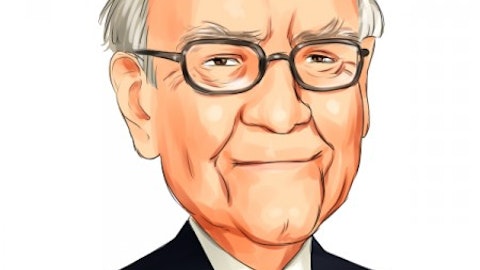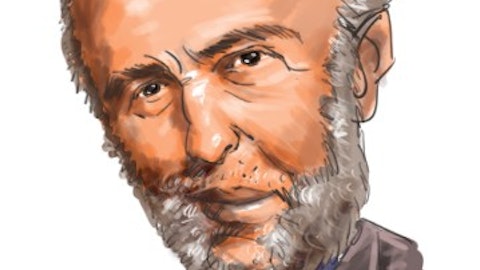Well, Buffett knows that he won’t be around forever. And he decided to hire 2 former hedge fund managers to replace him when the time comes. “Todd Combs and Ted Weschler, each of whom has spent several years on Berkshire’s investment team, are firstrate in all respects and can be of particular help to the CEO in evaluating acquisitions,” Buffett said about these two former hedge fund managers. Clearly, Buffett thinks he doesn’t need to invest in “very low-cost index funds”. In 2014, he bought new shares of his top 4 positions. This means only one thing: Buffett thinks these top four positions will perform better than “buying very low-cost index funds”. He also thinks Todd Combs and Ted Weschler, who are former hedge fund managers (I will explain shortly why I emphasize this point later), will be able to outperform the “very low-cost index funds” in the future.
We have good news for you. Buffett thinks that his stock picks will outperform the market because they outperformed the market in the past. We aren’t talking about 70s, or 80s, or 90s. Between 2008 and 2012, Warren Buffett’s top 5 stock picks outperformed the S&P 500 Index by 29 basis points per month. This is an annualized outperformance of 3.5 percentage points per year. Considering that Buffett has more than $73 billion invested in his top 5 holdings, an annual outperformance of 3.5 percentage points means additional gains of $2.5 billion per year for Berkshire shareholders. While, we understand why Buffett keeps buying his top 5 positions, we don’t understand why he keeps telling other investors to mindlessly invest in the other 495 stocks that aren’t good enough to make it into Buffett’s top picks.
Some Background
In 2008 Warren Buffett bet an opportunistic fund of hedge funds manager that a “very low-cost S&P 500 Index fund” would outperform a portfolio of hedge funds over the following 10 years. The opportunistic fund of hedge fund manager is Protege Partners’ Ted Seides who brilliantly calculated that it may cost him a maximum of $320 thousand to get to advertise his fund for a period of 10 years in all major financial magazines, sites, and business TV stations. Investing in hedge funds usually a terrible idea, investing in fund of hedge funds is even worse because you have to pay mind numbingly high hedge fund fees TWICE. If Seides would get lucky, as he initially did in 2008 and 2009 when the markets crashed, stocks would decline over the 10 year period and he would have looked very smart by beating Buffett. We believe that’s a very low probability event simply because inflation rates over a 10 year period usually runs closer to 30%. There is also population growth of about 10% over a 10 year period. A flat market implies a decline of 40% in overall earnings per capita (real dollars) which isn’t very likely.
Anyway, when Warren Buffett made this bet in 2008, he didn’t go ahead and buy index funds. He liked his top 5 positions better than Vanguard’s index funds. Over the next few years, he hired two hedge fund guys instead of buying low-cost index funds. These were the right decisions. Our research has shown that hedge fund managers are extremely talented stock pickers. The 30 most popular large cap stocks among hedge funds outperformed index funds by about 2 percentage points per year between 1999 and 2009. Large-cap stocks are usually difficult to tackle and Warren Buffett is STILL TODAY one of the best stock pickers in the large-cap space. On the other hand, small-cap stocks aren’t efficiently priced. The 15 most popular small-cap stocks among hedge funds outperformed the market by an average of 18 percentage points per year between 1999 and 2009. We have been sharing the list of these 15 stocks with our subscribers since the end of August 2012. Over the last 2.5 years, these stocks delivered a cumulative return of 131.4%, vs. 57.2% gain for “very low-cost index funds”. That’s an annualized return of 39.9% for hedge funds’ best ideas vs. 19.8% gain for Buffett’s “very low-cost index funds”.





